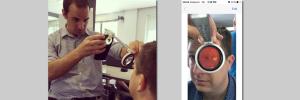
Rural eye health care enhanced with innovative mobile technology
"Health care has become increasingly expensive and there is a demand for more efficient health care that is of a higher standard." This is according to Dr William Mapham, an ophthalmology registrar at Stellenbosch University's (SU) Faculty of Medicine and Health Sciences.Mapham developed the Vula Health App in 2011 to improve the referral network through the use of mobile technology. Vula is a secure medical referral system geared for medical use.Health care workers use Vula to help guide the examination process of eye health conditions to ensure accurate referrals and to connect primary health care workers with specialists via chat messaging. This direct line of communication enables the correct treatment to be given on-site or referral to a specialist centre.Vula formed the basis of Mapham's MMed dissertation - publication pending - through the SU. He aimed to find out how the app was being used and what its impact on referral systems is. In 2014 it was tested at three sites, Tygerberg Hospital in the Western Cape, Zithulele in the Eastern Cape and Mosvold Hospital in KwaZulu-Natal.In the near future new specialisations outside of eye care, focusing initially on Orthopaedics and Cardiology, will be included in Vula.Over the past few years Vula has amassed an impressive collection of awards, of which the prizes listed below were awarded this year:
- The second prize in the Western Cape Premier's Entrepreneurship Recognition Awards
- The first prize in the Sustainable Entrepreneurship Awards in Vienna, Austria
- The second place in the South African Public Service Innovation Awards
- One of six prize winners for the African Entrepreneur Awards which was awarded at a ceremony in Morocco
- The SEED Award for exceptional social start-up enterprise which was awarded in Kenya
Another development in this success story is the inclusion of a 3D printed device that can be attached to a smartphone to enable health workers to take pictures of a patient's retina. With this inclusion doctors can screen patients for diabetes and view the optic nerve.The device was created by Dr Hong Sheng Chiong of Ophthalmicdocs in New Zealand and was demonstrated at the Vula Round Table Workshop which was held in Cape Town in October. The device cost less than R400 to 3D print, compared to the cost of more than R100 000 for a existing retinal camera."We have facilitated over 1 000 referrals to date. A large database that can possibly be used for teaching materials was created. A preliminary finding from studies has found that health care workers learn case by case how to treat their patients without making unnecessary referrals," said Mapham."Currently, Vula is a growing referral system," says Mapham, "and we look forward to the day when it is integrated into the Department of Health Online Electronic Record System. Then we will be able to close the loop between the referral and the treatment that followed."Vula is available on the Android and Apple App Stores and anyone can download it onto a smartphone, but only registered health workers are allowed to make referrals to specialists.
Photo caption: The latest development in the Vula eye app success story is the inclusion of a 3D printed device that can be attached to a smartphone to enable health workers to take pictures of a patient's optic nerve through the pupil
For more information contact James at [email protected]
This article appeared in the Faculty of Medicine and Health Sciences' digital publication VIVUS. Visit www.sun.ac.za/FMHSpublications to subscribe.
